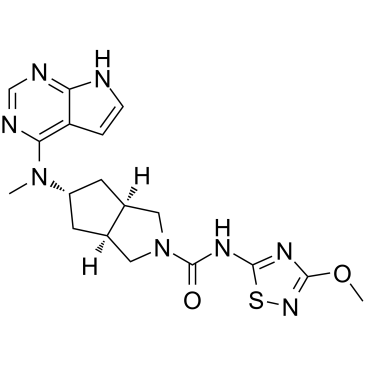1445987-21-2
| Name | SHR0302 |
|---|---|
| Synonyms | MFCD32701909 |
| Description | SHR0302 is a potent and orally active all members of the JAK family inhibitor, particularly JAK1. The selectivity of SHR0302 for JAK1 is >10-fold for JAK2, 77-fold for JAK3, 420-fold for Tyk2. SHR0302 inhibits JAK1-STAT3 phosphorylation and induces the apoptosis of hepatic stellate cells. SHR0302 has anti-proliferative and anti-inflammatory effects[1][2]. |
|---|---|
| Related Catalog | |
| Target |
JAK1 JAK2 JAK3 Tyk2 |
| In Vitro | SHR0302 (1 nM-10 µM; 48 hours; HSCs) treatment displays an inhibitory effect on the proliferation of HSCs in a concentration-dependent manner[2]. SHR0302 (1 nM-10 µM) exerts an inhibitory effect on the activation, proliferation and migration of HSCs[2]. SHR0302 (1 nM-10 µM; 48 hours; HSCs) treatment induces the apoptosis of HSCs[2]. SHR0302 (1 nM-10 µM; 48 hours; HSCs) treatment significantly increases the activation of caspase-3 and Bax in HSCs, and decreases the expression of Bcl-2. SHR0302 also inhibits the activation of Akt signaling pathway[2]. Cell Proliferation Assay[2] Cell Line: Hepatic stellate cells (HSCs) Concentration: 1 nM, 10 nM, 100 nM, 1µM, 10 µM Incubation Time: 48 hours Result: Displayed an inhibitory effect on the proliferation of HSCs, and that inhibition ocurred in a concentration-dependent manner. Apoptosis Analysis[2] Cell Line: Hepatic stellate cells (HSCs) Concentration: 1 nM, 10 nM, 100 nM, 1µM, 10 µM Incubation Time: 48 hours Result: Induced the apoptosis of HSCs. Western Blot Analysis[2] Cell Line: Hepatic stellate cells (HSCs) Concentration: 1 nM, 10 nM, 100 nM, 1µM, 10 µM Incubation Time: 48 hours Result: Significantly increased the activation of caspase-3 and Bax in HSCs, and decreased the expression of Bcl-2. Also inhibited the activation of Akt signaling pathway. |
| In Vivo | SHR0302 (0.3-3.0 mg/kg; intragastric administration; twice a day; for 14 days; male Sprague-Dawley (SD) rats) treatment suppresses the severity of AA rats by attenuating the arthritis index, arthritis global assessment and paw swelling degree, and alleviated histopathology of spleen and joint of AA rats[1]. SHR0302 can inhibit the proliferation of T, B and fibroblast-like synoviocytes (FLS), and down-regulates cytokines TNF-α, IL-1β, IL-17 and antibody IgG1, IgG2a levels, and suppresses the proportion of Th17 and total B, and inhibits JAK1-STAT3 phosphorylation[1]. Animal Model: Male Sprague-Dawley (SD) rats (150-180 g) injected with complete Freund’s adjuvant (CFA)[1] Dosage: 0.3 mg/kg,1.0 mg/kg, 3.0 mg/kg Administration: Intragastric administration; twice a day; for 14 days Result: Suppressed the severity of adjuvant-induced arthritis (AA) rats by attenuating the arthritis index, arthritis global assessment and paw swelling degree, and alleviated histopathology of spleen and joint of AA rats. |
| References |
| Molecular Formula | C18H22N8O2S |
|---|---|
| Molecular Weight | 414.48 |
| Hazard Codes | Xn |
|---|
